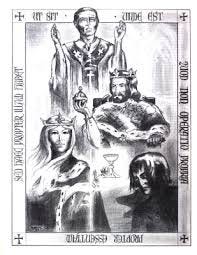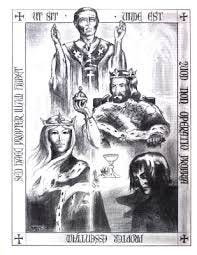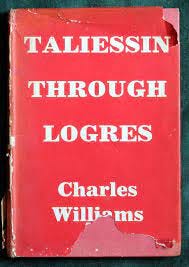
I see the Pendragon’s victory in That Hideous Strength as that book’s equivalent of the routing of Sauron in The Return of the King or the Romano-Celtic triumph over the Saxons at Mount Badon in Sword at Sunset. The enemy, in this latter example, are driven back to the eastern fringes of the realm - not expelled, unfortunately - but with their power broken for long years to come. We know that they are one day likely to return, as of course they do. The evil that is defeated in The Lord of the Rings is similarly capable of a comeback. Tolkien, indeed, envisioned a sequel in this vein, provisionally titled The Return of the Shadow. History, for him, was a ‘long defeat’ - a series of temporary successes always succeeded by renewed spells of darkness. Tolkien, however, was by no means a pessimist. He believed in Eucatastrophe - the happy ending - and the final overcoming of Morgoth and his minions at the end of time. Tolkien (and the same can be said of Lewis) is not naive or blind to the power of evil. He understands all too well the hold it has over the human heart. So in this fallen world and in this spiritually obtuse age, any reversal of this dynamic can only be short-term, though the wins that we do notch up are solid and real achievements in and of themselves. They count for much, and they all, in their own way, foreshadow and bring nearer the Parousia of the Lord.
This is brought sharply into focus at the conclusion of That Hideous Strength as Ransom and his Company reflect on the deeper meaning of their triumph. It forms part of a wider pattern, Dr. Dimble says, which can be observed throughout British history:
“It all began when we discovered that the Arthurian story is mostly true history. There was a moment in the sixth century when something that is always trying to break through into this country nearly succeeded. Logres was our name for it - it will do as well as another. And then … gradually we began to see all English history in a new way. We discovered the haunting.
“What haunting?” asked Camilla.
“How something we may call Britain is always haunted by something we may call Logres. Haven’t you noticed that we are two countries? After every Arthur, a Mordred; behind every Milton, a Cromwell: a nation of poets, a nation of shopkeepers; the home of Sidney - and of Cecil Rhodes. Is it any wonder they call us hypocrites? But what they mistake for hypocrisy is really the struggle between Logres and Britain.”
Dimble goes deeper:
“It was long afterwards, after the Director had returned from the Third Heaven, that we were told a little more. Ransom was summoned to the bedside of an old man then dying in Cumberland. His name would mean nothing to you if I told it. That man was the Pendragon, the successor of Arthur and Uther and Cassibelaun. Then we learned the truth. There has been a secret Logres in the very heart of Britain all these years; an unbroken succession of Pendragons. That old man was the seventy-eighth from Arthur; our Director received from him the office and the blessing; tomorrow we shall know, or tonight, who is to be the eightieth. Some of the Pendragon’s are well-known to history, though not under that name. Others you have never heard of. But in every age they and the little Logres which gathered round them have been the fingers which gave the tiny shove or the almost imperceptible pull, to prod England out of the drunken sleep or to draw her back from the final outrage into which Britain tempted her.”
The British people, if they are to have a future, need to tune into this ‘haunting’ and listen and act upon what it says. ‘We speak about Logres,’ Dimble goes on, ‘because it is our haunting, the one we know about.’ Moreover:
“The whole work of healing Tellus depends on nursing that little spark, on incarnating that ghost, which is still alive in every real people, and different in each. When Logres really dominates Britain, when the goddess Reason, the divine clearness, is really enthroned in France, when the order of Heaven is really followed in China - why, then it will be spring. But meantime, our concern is with Logres.”1
Logres, despite this global reach, is not a vague abstraction. It is rooted always in a specific time and place. From there, its influence grows and spreads like the mustard seed in Our Lord’s parable.
Lewis grounded his vision of Logres in the type of physical reality he knew best - an English university town. It is based in an imaginative milieu which he was also at home in - the world of King Arthur, Merlin, and the Round Table. In this respect, Lewis's conception of Logres is akin to that of his friend and fellow-Inkling Charles Williams. It is not so much that Lewis borrowed or stole from Williams's Arthurian verse, more that he repurposed his poetry and gave it a second life in the form of a novel. That Hideous Strength can be read as a commentary on Williams's Arthuriad and also as an imaginative resetting of its themes, especially that of Logres - the Platonic Form - that 'spark' or 'ghost' or inner essence of what is known today as Britain.
Williams published two volumes of Arthurian poetry - Taliessin Through Logres (1938) and The Region of the Summer Stars (1944). I want to focus mainly in this essay on The Last Voyage, the penultimate poem in the first book. It speaks directly to the inner meaning of the civilisational changes and disturbances we are currently living through. It is a poem of dissolution and renewal, though the renewal seems at first sight more like a withdrawal and retreat. The Empire is breaking up and Logres is losing its imaginative hold on the hearts and minds of its public. It is becoming Britain, something altogether more prosaic and workaday. The three Grail winners - Galahad, Percivale and Bors - are bearing the Grail away to the sacred city of Sarras on a magical ship fashioned centuries before by King Solomon. The glory is departing. The Arthurian iteration of Logres has failed in its mission. Spiritual blindness and human weakness and muddle have stymied its potential, and now its moment has gone. The Parousia will not now take place in Arthur's Kingdom, as had been the original Divine intent and plan.
We might assume then that the atmosphere of the poem will be one of sackcloth and ashes, but the reverse is actually the case. The Last Voyage, all four and a half pages of it, is a strong and potent - almost Nietzschean - piece of work. It is taut and rigourous, purposeful and positive, brimming over with a surging, whiplash, wave-tossed spark and energy:
But the actual ship, the hollow of Jerusalem,
beyond the shapes of empire, the capes of Carbonek,
over the topless waves of trenched Broceliande,
drenched by the everlasting spray of existence,
with no mind's sail reefed or set, no slaves at the motived oars,
drove into and clove the wind from unseen shores.
Swept from all altars, swallowed in a path of power
by the wrath that wrecks the pirates in the Narrow Seas,
now in the confidence of the charge, the thrust of the trust,
seizing the sea-curve, the shortest way between points,
to the point of accumulated distance, the safe tension
in each allotted joint of the knotted web of empire,
multiple without dimension, indivisible without uniformity,
the ship of Solomon (blessed be he) drove on.
Galahad sings in the prow - a song of prayer, thanksgiving, and regeneration. He prays for the living and the dead, the killers and the killed, victims all of 'the deep schismatic war' turning Logres into Britain. It is an all-embracing chant of redemption and reintegration. It gives Galahad the 'necessity of being' that allows him, as the ship draws near to Sarras, to share in the life of the Blessed Trinity:
Through the sea of omnipotent fact rushed the act of Galahad.
He glowed white: he leaned against the wind
down the curved road among the topless waters.
He sang, Judica te, Deus; the wind,
driven by doves' wings along the arm-taut keel,
sang against itself Judica te, Deus.
Prayer and irony had said their day and ceased;
the sole speech was speed.
In the hollow of Jerusalem the quadrilateral of the sun
was done on the deck beyond Broceliande.
In the mosntrum of triangular speed,
in a path of lineal necessity,
the necessity of being was communicated to the son of
Lancelot.
The ship and the song drove on.
Galahad, Percivale and Bors are on a different plane now to the humdrum events concurrently taking place at home:
In Logres the King’s friend landed, Lancelot of Gaul.
Taliessin at Canterbury met him with the news
of Arthur’s death and the overthrow of Mordred …
Logres was withdrawn to Carbonek; it became Britain.2
Real life is elsewhere. The Grail is occluded and veiled. Will it come again? Divine power, in That Hideous Strength, certainly made its presence felt in twentieth-century England, so we can trust that Lewis was on to something and that the door that for now bars us from the sacred will not always remain shut. In reality, there are no locks and bolts at all. It is the materialistic set of assumptions within which our lives are framed that deprive us of the ability to see the world as it truly is. The sands of time are running down on this paradigm, however. New ways of seeing and being are starting to appear. As I wrote in my first essay:
Topics are presented and discussed today, which fifteen years ago, when the New Atheists were in their pomp, would have been considered marginal or 'woo woo' - the symbolic structure of the universe, our inner need for mythic pattern and coherence, and the magnetic pull of the numinous and Divine. All these themes and more are gathering momentum on YouTube and other platforms in ways which could not have been foreseen in the days when we thought we were living through the 'end of history'.
René Guénon, in The Reign of Quantity and the Signs of the Times, reminds us that what is approaching is not the end of the world but the end of a world - the end of an illusion, in short - the rationalistic, technocratic grid, which we have artfully constructed to protect ourselves from reality and to make the numinous and the holy feel both irrelevant and inconceivable.3 Those with a vested interest in maintaining the status quo will thrash and flail around and gladly embrace totalitarianism, if it comes to it, to keep the simulacra running. We can already see this happening in Canada, for example, or certain parts of the US. But the tides of time - the meta-historical dynamics, you might say - are against them. Our best option in this great upheaval is not to join in with the coming chaos - as Aleksandr Dugin seems to advocate - but rather to align ourselves to what will eventually replace the current dispensation, what he rightfully calls ‘The Great Awakening.’ This is the return of the King, the return of the Real, or ‘The Event’ as Heidegger strikingly put it.
That said, we need to remember that there are no guarantees. We might foul it all up as Arthur, Lancelot and Guinevere do in Williams’s mythos. The ‘Event’, The Parousia, the coming of the Grail, might need to be postponed again. But that is no excuse for inaction or for burying our talents. ‘I will not cease from mental fight’ vows Blake. There is no future in an illusion. It is better to invest in truth and reality than to prop up or unnecessarily contribute to a political, social and economic system that is a stranger to both.
Lewis and Williams were profoundly attuned to this level of Being and they gave it dynamic, prophetic life in their novels and poems. I would like now to add a third name in this context - Anne Ridler (1912-2001), an accomplished poet and librettist, who was also a friend and confidante of Williams and worked closely with him on the drafting of Taliessin Through Logres. During the Second World War, with Britain’s future under threat, she composed a poem called Taliessin Reborn, which is both a tribute to her mentor and a statement of faith in the permanence and inviolability of the deep Platonic Logres, ‘whose shores’, as the poem puts it, ‘were birth’, and ‘whose towers were order.’ Did we catch a glimpse of Logres, I wonder, in the days that followed the passing of Queen Elizabeth II? What was revealed? What was unveiled? ‘Shapes of the true self’, Ridler would reply …
The depth and height of an unguessed perfection …
There was the real map of England: by
the deep valleys of potentiality
Rose the peaks of her fulfilled power …
A country of conscious being,
Of contemplated life.4
We will return next month to Taliessin Reborn and Ridler’s conclusion. For now, it will be good to end with a reminder of what the return of Logres both looks like and anticipates. Williams paints a picture for us in Mount Badon, his one meditation on that decisive moment when negativity and evil are thrust back to the margins and a clearing is made for the Divine to mould and shape a nascent civilisation. Albion awakes, Britain becomes Logres, and we know and understand that it has always been this way and that it is only our empiricism and hyper-rationalism - Blake’s ‘mind-forg’d manacles’ - that keep the truth occluded and concealed.
Logres, it should be stressed, is not a static state of affairs, a fixed, measurable entity, circumscribed within its own parameters. It is a darting, fluid thing, more like fire or wind, that points us towards the advent of an exponentially greater dawn to come. This, of course, is the Eschaton, the return of Christ as King, Judge and Lord - Christos Pantokrator - the ruler of all.
All our renewals and restorations foreshadow and prefigure this mighty cosmic Event. Had everything gone well, says Williams, this would already have happened in Arthur’s reign. That was the plan. Maybe we will see it in our time. Maybe not. We will know it when it comes though. When the Event flashes forth among us it will look, feel and sound something a little like this:
The trumpets of the City blared through the feet of brass;
the candles flared among the pirates; their mass broke;
Bors flung his company forward; the horse and the reserve
caught the sea’s host in a double curve;
the paps of the day were golden-girdled;
hair, bleached white by the mere stress of the glory,
drew the battle through the air up threads of light.
The tor of Bacon heard the analytical word;
the grand art mastered the thudding hammer of Thor,
and the heart of our Lord Taliessin determined the war …
The Lord Taliessin kneeled to the king;
the candles of new Camelot shone through the fought field.5
C.S. Lewis, That Hideous Strength (Pan Books, 1955), pp.240-241.
Charles Williams, Taliessin Through Logres (Oxford University Press, 1938), pp.84-88.
René Guénon, The Reign of Quantity and the Signs of the Times (Sophia Perennis, 2001) p.279
Anne Ridler, Collected Poems (Carcanet, 1994) pp.46-48.
Taliessin Through Logres, p.18.





